
Archaeological and Anthropological Sciences
Scope & Guideline
Advancing Knowledge at the Intersection of Time and Culture
Introduction
Aims and Scopes
- Interdisciplinary Research:
The journal emphasizes interdisciplinary approaches, combining archaeology with chemistry, biology, and environmental sciences to analyze artifacts and ecofacts. - Material Analysis:
A significant focus is on the scientific analysis of materials, including pottery, metals, and organic remains, utilizing techniques such as isotopic analysis, chemical characterization, and experimental archaeology. - Cultural and Technological Evolution:
Papers often explore the evolution of technologies and cultural practices, including subsistence strategies, metallurgy, and craft production across different historical periods. - Environmental Interactions:
Research frequently addresses human-environment interactions, examining how climatic and ecological changes influenced human behavior and settlement patterns. - Bioarchaeology:
The journal includes studies on human remains, focusing on health, diet, and social structure, utilizing bioarchaeological and isotopic methods to infer past lifestyles. - Global Perspectives:
While it covers a wide geographical range, there is a notable emphasis on underrepresented regions in archaeological research, promoting a more global understanding of human history.
Trending and Emerging
- Isotopic Analysis in Diet Reconstruction:
There is a growing emphasis on isotopic analysis for reconstructing ancient diets, allowing for more precise understandings of past subsistence strategies and mobility patterns. - Material Culture and Technological Studies:
Increasingly, research focuses on the technological aspects of material culture, such as production techniques and resource procurement, providing insights into ancient economies. - Environmental Archaeology:
Emerging studies are increasingly integrating environmental archaeology, examining how past human societies adapted to and modified their environments, particularly in the context of climate change. - Experimental Archaeology:
There is a notable rise in experimental archaeology, where researchers replicate ancient techniques to better understand the practical aspects of past technologies and cultural practices. - Interdisciplinary Approaches:
A trend towards interdisciplinary collaboration is evident, with studies increasingly combining methods from various fields, such as chemistry, biology, and anthropology, to enrich archaeological interpretations. - Focus on Underrepresented Regions:
An emerging trend is the increased focus on underrepresented regions and cultures in archaeological research, promoting a more inclusive narrative of human history.
Declining or Waning
- Traditional Pottery Analysis:
While pottery remains a key topic, the focus on traditional descriptive analyses without scientific backing has decreased, giving way to more sophisticated chemical and isotopic studies. - Historical Narratives without Scientific Evidence:
Papers relying solely on historical narratives without integrating scientific evidence have become less common, as there is a growing expectation for data-driven conclusions. - Single-Site Studies:
There is a noticeable decline in studies focusing on single archaeological sites without broader contextualization or comparison, as researchers seek to draw wider conclusions from their findings. - Generalized Cultural Studies:
The trend towards generalized cultural studies that do not incorporate material evidence or scientific methods appears to be waning, with a shift towards more specific and evidence-based investigations.
Similar Journals
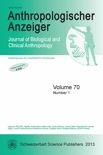
ANTHROPOLOGISCHER ANZEIGER
Cultivating Insights into the Natural WorldANTHROPOLOGISCHER ANZEIGER, published by E Schweizerbart'sche Verlagsbuchhandlung, is a distinguished journal dedicated to the interdisciplinary fields of anthropology, animal science, and ecology, with a notable impact on advancing research in these areas. Since its inception in 1971, the journal has played a critical role in providing a platform for innovative research, fostering scholarly exchange, and enhancing the understanding of human and animal interactions and ecosystems. With its current quartile rankings—Q2 in Anthropology and Q3 in Animal Science and Zoology—it is well-positioned to serve as a vital resource for researchers, professionals, and students alike. Although it does not currently offer open access, the journal remains an essential asset for those looking to deepen their knowledge and contribute to ongoing discussions within these intersecting disciplines. For additional information, visit the publisher's office located at NAEGELE U OBERMILLER, SCIENCE PUBLISHERS, JOHANNESSTRASSE 3A, D 70176 STUTTGART, GERMANY.

Annual Review of Anthropology
Bridging Disciplines for a Deeper UnderstandingAnnual Review of Anthropology is a premier journal published by Annual Reviews, dedicated to providing comprehensive and authoritative reviews in the field of anthropology. Established with the goal of synthesizing essential research findings, this influential publication not only shapes contemporary anthropological discourse but also facilitates interdisciplinary dialogue within the broader realm of social sciences and cultural studies. With an impressive impact factor that places it in the Q1 category across multiple classifications, including Anthropology and Arts and Humanities, this journal is highly regarded by researchers and academics alike. The Annual Review of Anthropology has been a trusted resource for critical insights and transformative ideas, helping to advance the understanding of human societies from 1980 to the present. Although it does not offer open access, access to its articles is available through various academic institutions, ensuring that both seasoned scholars and students can benefit from its wealth of knowledge. With a Scopus ranking placing it in the top percentiles for relevant subjects, this journal is essential reading for anyone looking to stay at the forefront of anthropological research.

Deltion of the Christian Archaeological Society
Bridging Disciplines: Understanding Faith Through ExcavationDeltion of the Christian Archaeological Society (ISSN: 1105-5758, E-ISSN: 2241-2190), published by the Christian Archaeological Society in Athens, Greece, stands as a pivotal source of scholarly work within the realm of Christian archaeology. This journal is dedicated to disseminating high-quality research that promotes the understanding of Christian history, heritage, and archaeological practices. Though it operates under traditional access options, it provides a comprehensive platform for researchers and professionals alike, fostering dialogue and collaboration within the archaeological community. With a commitment to advancing knowledge, the Deltion aims to support both established scholars and emerging voices, reinforcing the significance of archaeology in interpreting religious narratives and cultural contexts. Researchers, students, and professionals interested in the intersections of archaeology, history, and theology will find this journal an invaluable resource in their scholarly pursuits.
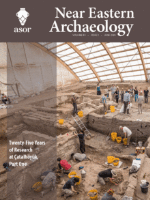
NEAR EASTERN ARCHAEOLOGY
Delving Deep into the Near East's Cultural LegacyNEAR EASTERN ARCHAEOLOGY, published by University of Chicago Press, is a premier journal dedicated to the field of archaeology, particularly focusing on the rich cultural heritage and archaeological findings of the Near East. With an ISSN of 1094-2076 and an E-ISSN of 2325-5404, this esteemed publication provides a vital platform for scholars and practitioners to share their research, insights, and discoveries. The journal holds an impressive ranking in the Q1 quartile for both Archaeology and History in 2023, reflecting its significant impact within these fields and a robust history of scholarly contribution. The journal has been pivotal in shaping discussions around archaeological methodology, theory, and contemporary issues from 2002 to 2024, as it continues to reach a wide audience through various access options. With Scopus rankings placing it in the top percentiles for both History and Archaeology, NEAR EASTERN ARCHAEOLOGY represents an essential resource for researchers, professionals, and students alike, fostering the exploration and understanding of the region's archaeological narrative.

Journal of Pacific Archaeology
Unlocking the Secrets of Pacific HeritageThe Journal of Pacific Archaeology, published by the New Zealand Archaeological Association, serves as a pivotal platform for disseminating cutting-edge research in the field of archaeology across the Pacific region. With an ISSN of 1179-4704 and an E-ISSN of 1179-4712, the journal provides a forum for scholarly discourse aimed at both established researchers and emerging scholars alike. Focusing on the rich tapestry of archaeological studies, it covers a diverse array of topics, from ancient settlement patterns and cultural practices to contemporary analyses of material culture. As an Open Access journal, it ensures that its findings are readily available to all, fostering inclusivity in academic research and enabling practitioners to share knowledge without barriers. The Journal of Pacific Archaeology is indispensable for those committed to understanding the complexities and nuances of Pacific archaeology, making significant contributions to both regional and global archaeological narratives.

Mediterranean Archaeology & Archaeometry
Unveiling the Secrets of the Mediterranean PastMediterranean Archaeology & Archaeometry is a premier academic journal dedicated to advancing the fields of archaeology, anthropology, conservation, and history, published by UK Zhende Publishing Ltd. With its ISSN 1108-9628 and E-ISSN 2241-8121, this journal serves as a vital platform for scholars and practitioners to disseminate innovative research and findings related to the rich archaeological heritage of the Mediterranean region. It has gained remarkable recognition, achieving a Q2 ranking in anthropology and archaeology, and a Q1 classification in several categories including arts and humanities, conservation, and history as of 2023. Its impressive Scopus rankings underscore its impact, with a significant position in history (59/1760) and conservation (11/103) disciplines. Spanning years from 2008 to 2022, the journal invites open access contributions to foster collaboration and interdisciplinary dialogue among researchers, students, and professionals alike, making it an indispensable resource for those engaged in the exploration and preservation of historical narratives within the Mediterranean context.
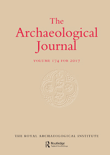
Archaeological Journal
Advancing Knowledge, Preserving Our PastArchaeological Journal, published by Taylor & Francis Ltd, stands as a leading voice in the field of archaeology, with a remarkable distinction in the Q1 category for both arts and humanities as well as conservation, underscoring its critical role in advancing scholarly dialogue and research. With an ISSN of 0066-5983 and E-ISSN of 2373-2288, this journal provides a platform for innovative research from 1977, now offering insights up to 2024. The United Kingdom-based journal is highly regarded, being within the top 81st percentile in archaeology and conservation according to Scopus rankings. Essential for researchers, professionals, and students, the journal's content spans rigorous archaeological studies, theoretical advancements, and discussions on conservation practices, ultimately aimed at fostering a deeper understanding of humanity's past. Notably, with no open access option, it maintains a traditional publishing approach, thereby ensuring curated and high-quality contributions to the academic community.

Interdisciplinaria Archaeologica-Natural Sciences in Archaeology
Bridging Disciplines, Unveiling the PastInterdisciplinaria Archaeologica-Natural Sciences in Archaeology is a distinguished journal published by UNIV HRADEC KRALOVE, dedicated to the exploration and integration of natural sciences within the context of archaeology. With an impact factor that reflects its strong footing in the academic community, this journal provides a vital platform for interdisciplinary research, fostering collaboration among archaeologists, scientists, and scholars from diverse fields. Since its transition to Open Access in 2010, it has made significant contributions to the accessibility of research findings, connecting global audiences interested in the archaeological sciences. Based in the Czech Republic, the journal has achieved impressive rankings—placing in the Q2 quartile across both Archaeology and Arts and Humanities categories, as well as respectable standings in the Social Sciences domain. Over its converged years from 2014 to 2024, it has published cutting-edge studies that enhance our understanding of past human behaviors through scientific methodologies. Researchers, professionals, and students are encouraged to engage with the journal’s content to contribute to and benefit from the vibrant discourse in archaeological science.
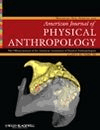
AMERICAN JOURNAL OF PHYSICAL ANTHROPOLOGY
Pioneering Research on Human VariationAMERICAN JOURNAL OF PHYSICAL ANTHROPOLOGY, published by Wiley, has established itself as a leading platform in the field of physical anthropology since its inception in 1918. This esteemed journal, identifiable by its ISSN 0002-9483 and E-ISSN 1096-8644, has been instrumental in disseminating groundbreaking research, achieving impressive rankings in both Social Sciences (Rank #18/443, 96th percentile) and Medicine (Rank #9/44, 80th percentile) categories within Scopus. Although its coverage in Scopus has concluded as of 2021, the journal continues to be a vital resource for academics and professionals seeking to explore the biological aspects of human evolution and variation. With a commitment to high-quality, peer-reviewed publications, the journal supports open access to enhance the visibility and accessibility of anthropological research globally. Researchers, students, and professionals are encouraged to engage with the innovative findings published in this journal, contributing to the ongoing dialogue in physical anthropology.
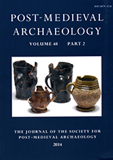
Post-Medieval Archaeology
Revealing the Rich Tapestry of Post-Medieval LifePost-Medieval Archaeology is a distinguished academic journal published by ROUTLEDGE JOURNALS, TAYLOR & FRANCIS LTD, focusing on the rich tapestry of human history from the post-medieval period through the lens of archaeology. With a proud publication history spanning since 1967, this journal addresses the integration of archaeological findings with historical narratives, contributing significantly to the field of archaeology and history. The journal holds an impressive categorization within the Q2 and Q3 quartiles for Archaeology and History in 2023, showcasing its commitment to academic excellence and relevance within these disciplines. Researchers and professionals alike will find value in its critical examinations and innovative methodologies that illuminate the past, making it a pivotal resource for those engaged in archaeological research. As an essential platform for scholarly debate and dissemination, Post-Medieval Archaeology continues to advance the understanding of post-medieval contexts and material culture, fostering discussions that resonate through various areas of the arts, humanities, and social sciences.